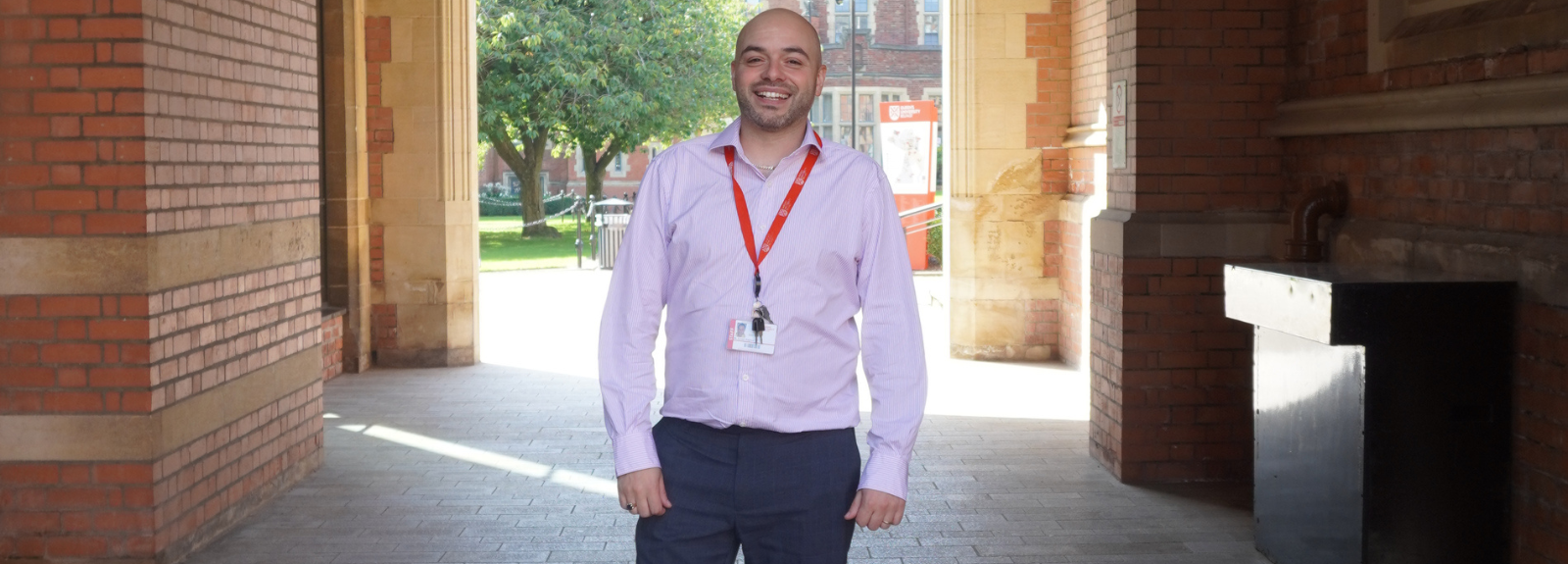Ayman is the Head of People and Culture Digital Systems and Analytics.
Can you tell us a little bit about your role at Queen's?
As Head of People and Culture Digital Systems and Analytics, my role is to lead the development and support of all HR systems. A large part of this is about driving digital transformation within People and Culture, both for our own staff and also colleagues across the wider University, ensuring our systems support as best they can.
Another key element of my role is data. We hold an enormous amount of information across our systems, and part of my job is to make sure that data is used correctly and in a meaningful way. Analysing and presenting information in the right way can make a huge difference - whether that’s identifying patterns in recruitment, spotting pressure points in processes, or helping leaders make decisions with confidence. Good data insights are about more than just numbers, as they help Queen’s make smarter, more proactive choices and, hopefully, improve the experience of staff working here.
What does a typical day look like for you?
I can honestly say I don’t have too many typical days. While there are some recurring themes, my work is incredibly varied. I’m involved in several projects at any given time, which keeps things interesting. At the moment, some of the key initiatives my team and I are focused on include digitising the PDR process, developing a Chatbot, and going live with a new Onboarding Portal. Something new is always being planned or up ahead.
Problem-solving is also a big part of my daily work. Systems and technology are powerful tools, but they don’t always work perfectly. In People and Culture, we often have to react quickly to unexpected priorities, and there’s usually no shortage of challenges to get stuck into. It means no two days are ever quite the same, and that variety is something I really enjoy.
What do you find most rewarding about your role?
For me, the most rewarding part of the job is working with people and helping to make their day-to-day work easier. It doesn’t always have to be a major development. Sometimes it’s as simple as showing someone a better way to use a system or making a process less time-consuming. Those smaller improvements can have a big impact, and seeing the difference it makes for colleagues is what I enjoy most.
Can you share a memorable experience or milestone moment during your time at Queen’s?
A milestone that stands out is my recent promotion to this role. I started at Queen’s back in 2012 as a Grade 5 in Finance and have worked my way into my current position. It’s been a journey of learning new skills, staying committed, and doing my best to build positive relationships.
I think my path shows how rewarding Queen's can be as a place to build a career. I have worked hard and been committed along the way, and been successful when the right opportunities have come up. I enjoy my job, I like the people I work with, and I genuinely believe this is a great place to work. I think that combination has made the journey worthwhile.
What are your interests outside of work?
Football is probably my main interest, specifically Celtic. I’ve been a supporter from pretty much the day I was born! I enjoy getting over to Glasgow, or further, whenever I can to follow them. Sport also plays a big part in family life. Both of my kids are active; my daughter plays for a GAA club and my son for a local football club. My wife and I spend a lot of the evenings and weekends on the sidelines watching their games or training, which I really enjoy.
Outside of sport, I like to keep up with new technology trends. I’ve always had an interest in the latest gadgets and developments, and it ties in naturally with the work I do.
What advice or insight would you share with someone new to Queen’s?
My biggest piece of advice would be to build relationships. It’s something I learned from a previous manager who did it exceptionally well. The key to getting things done is working well with people. No matter how good a digital process is, or what role AI might play in the future, people coming together and working through issues or problems will always remain central to how the University works. If you get the relationships and teams right, most other things will hopefully come into place, or at least become easier!
I’d also say keep things simple. Universities are naturally complex places, and change often requires persistence and patience. But I’ve always found that if you keep things simple, as much as possible, that’s the best way forward.
